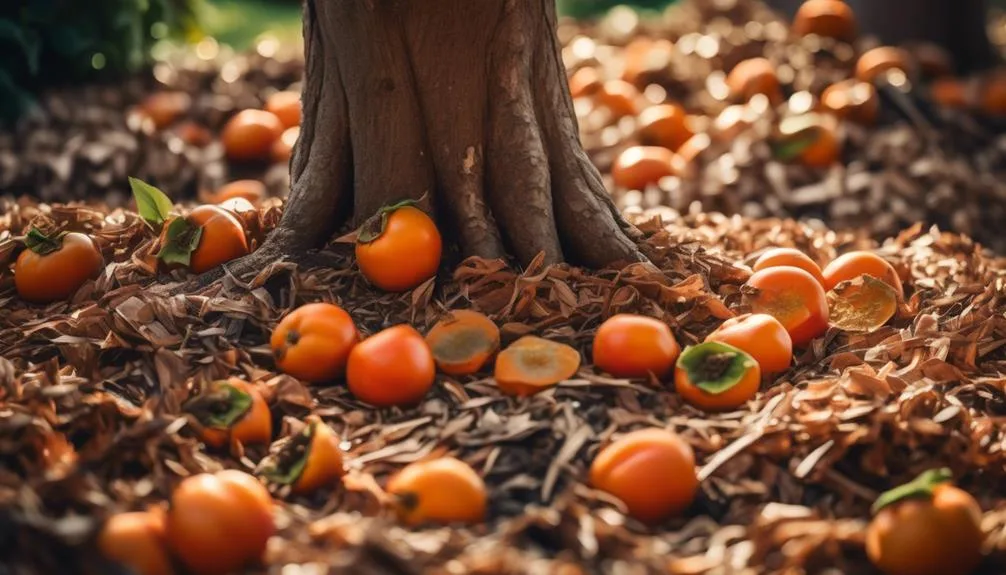Choosing the right mulch for your persimmon trees is crucial for their growth and health. There are many options, from organic mulches like compost and wood chips to inorganic ones like gravel and landscape fabric.
Each type has unique benefits for your trees, but how do you know which one is best for you? Let's take a look at the different mulching options to find the perfect match for your persimmon trees.
Key Takeaways
- Organic mulches like wood chips, bark, and straw are excellent choices for moisture retention and weed suppression around persimmon trees.
- Maintaining a depth of 2-4 inches of mulch around the root zone of persimmon trees helps maintain consistent moisture levels and enriches the soil with organic matter and nutrients.
- Inorganic mulches such as plastic sheeting or gravel can also be used for weed suppression and moisture retention around persimmon trees.
- Mulching with materials like newspaper or aged manure can improve soil structure, retain soil moisture, and moderate soil temperature for optimal growth and fruit production of persimmon trees.
Organic Mulches
Consider using a variety of natural materials, such as straw, wood chips, or leaves, to provide organic mulches for your persimmon trees, as they can help retain moisture and suppress weed growth.
Organic mulches offer numerous benefits for your persimmon trees. They act as a protective barrier, shielding the soil from extreme temperatures and erosion while providing a slow release of nutrients as they decompose.
When applying organic mulch, ensure it's spread evenly around the base of the tree, but avoid piling it up against the trunk. This will help maintain a consistent soil temperature and moisture level, promoting healthier root development.
Additionally, organic mulches encourage beneficial soil organisms, fostering a more balanced and fertile growing environment for your persimmon trees.
When properly applied, organic mulches can significantly enhance the health and productivity of your persimmon trees.
Inorganic Mulches
Inorganic mulches, such as plastic sheeting or gravel, offer an alternative to organic materials for providing weed suppression and moisture retention for your persimmon trees. These mulch alternatives can be particularly useful in areas with high winds or heavy rains, where organic mulches might be easily displaced.
When using plastic sheeting, make sure to secure it properly and create small holes for water to penetrate. Gravel, on the other hand, can be aesthetically pleasing while still serving its purpose.
When applying inorganic mulches, ensure that they're laid evenly and extend a few inches away from the base of the tree to allow for proper air circulation.
Inorganic mulches are a low-maintenance option for mulch application, providing long-lasting weed control and moisture conservation for your persimmon trees.
Mulch for Moisture Retention
When aiming to maximize moisture retention for your persimmon trees, explore mulch options that can complement the low-maintenance benefits of inorganic materials while effectively regulating soil moisture.
Organic mulches like wood chips, bark, and straw are excellent choices for moisture retention. These mulch types create a protective barrier, reducing water evaporation from the soil and helping to maintain consistent moisture levels around the root zone of your persimmon trees. Additionally, they gradually break down, enriching the soil with organic matter and nutrients.
When applying organic mulch for moisture retention, make sure to maintain a depth of 2-4 inches, keeping it a few inches away from the trunk to prevent moisture-related issues.
Mulch for Weed Control
To effectively suppress weed growth around your persimmon trees, consider using organic mulches such as wood chips or straw. These mulches not only help to control weeds but also offer additional benefits such as improving soil structure, retaining soil moisture, and moderating soil temperature. Here are some common mulch types and their benefits for weed control:
| Mulch Type | Benefits |
|---|---|
| Wood Chips | Suppresses weed growth, retains moisture, improves soil structure |
| Straw | Prevents weed germination, conserves moisture, adds organic matter to soil |
| Newspaper | Blocks sunlight to prevent weed growth, decomposes to enrich soil |
Using the right mulch can significantly reduce the time and effort needed for weed management, allowing your persimmon trees to thrive without competition from invasive plants.
Mulch for Nutrient Enhancement
Consider how mulching around your persimmon trees can't only suppress weed growth but also enhance the nutrient content of the soil, promoting the overall health and productivity of your trees.
Choosing the right mulch types can significantly impact the nutrient benefits for your persimmon trees. Here are some options to consider:
- Organic mulches such as compost or bark can gradually break down, releasing essential nutrients into the soil.
- Nutrient-rich mulch types like aged manure or leaf mold can directly provide valuable elements for the trees' growth.
- Mulches with nitrogen-fixing properties, such as clover or alfalfa, can enrich the soil and foster better nutrient absorption.
- Using mulch with mycorrhizal fungi can establish a symbiotic relationship with the tree roots, aiding in the absorption of nutrients and water.
These mulch types can enhance the soil's nutrient content, ensuring your persimmon trees receive the essential elements for optimal growth and fruit production.
Conclusion
Incorporating organic mulches like compost, wood chips, or straw can nourish and enhance the soil around your persimmon trees, promoting their health and vitality.
Alternatively, inorganic mulches such as rocks or plastic can aid in moisture retention and weed management.
Selecting the right mulch tailored to your specific needs will support the flourishing of your persimmon trees.
Consider the impact of your choice and witness the lasting benefits it brings to your garden.

